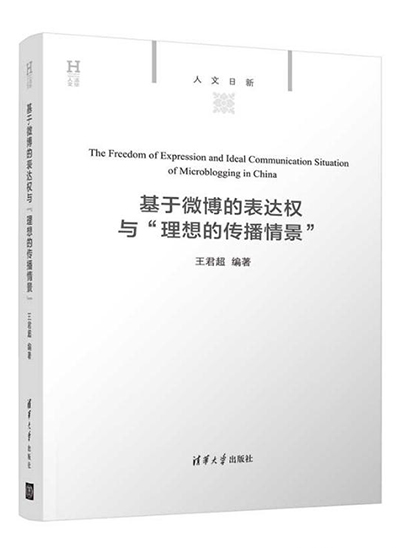A study on Weibo’s communication mode

The Freedom of Expression and Ideal Communication Situation of Microblogging in China
The Freedom of Expression and Ideal Communication Situation of Microblogging in China, by Wang Junchao, a professor from the School of Journalism and Communication at Tsinghua University, focuses on the communication mechanism and mode of Sina Weibo from a critical perspective, combining theories of the public sphere, communication behavior, and global internet governance.
The book takes Weibo as an example to study the strengths and problems of new media in fulfilling people’s right of expression. It discusses how to use good governance to overcome the “distorted communication” phenomenon such as rumors and comments made by organized groups of paid posters on Weibo, portraying an ideal communication situation with a civilized, rational, and tolerant network culture.
Wang gives theoretical explanations on grand issues such as how Weibo is changing China, Weibo’s ideological functions, and Weibo’s political and economic hotspots. Additionally, he selects different cases for detailed data processing and analysis. For example, at the meso-level, he elaborates on Weibo as a “constructive medium” from four aspects.
One is the construction of social capital by Weibo. As a form of capital, the social capital of Weibo is the sum of resources or capabilities mobilized through social networks. The second is Weibo’s construction of modes of media discourse. The information flow of Weibo is from the edge to the center, and its way of discourse is civilian, exploratory, and emotional, standing out in terms of affinity and proximity.
The third is Weibo’s construction of supervision by public opinion. Some certifications such as “independent investigative reporters” have appeared on Weibo. Weibo’s self-media exposure platform corresponds to people’s anti-corruption call, achieving many “internet anti-corruption cases” that attracted a vast audience.
Fourth, according to Jurgen Habermas’s definition of the “public sphere,” Weibo can be regarded as a media with certain “public sphere” potential in China. Its potential is manifested in the characteristics of “grassroots media,” the wide range and timeliness of topic discussion, and the practice of the people’s expression rights.
At the micro-level, Wang combines batches of specific cases and reviews the issue of Weibo as a “maker, disseminator, and receiver of rumors,” revealing the source, variations, and social impact of those rumors. He divides the rumors into types of worry, wish, “chicken soup for the soul,” and hatred, and uses classic sociological and psychological theories and methods to analyze rumors’ transmission mechanism on Weibo. He also mathematically calculates a formula and mode of rumor dissemination to understand its laws at an abstract level.
Hao Yu is a professor from the School of Journalism and Communication at Shanghai University.
Edited by YANG LANLAN

 PRINT
PRINT CLOSE
CLOSE